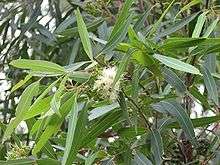Eucalyptus curtisii
| Plunkett mallee | |
|---|---|
 | |
| Rare (NCA) | |
| Scientific classification | |
| Kingdom: | Plantae |
| (unranked): | Angiosperms |
| (unranked): | Eudicots |
| (unranked): | Rosids |
| Order: | Myrtales |
| Family: | Myrtaceae |
| Genus: | Eucalyptus |
| Species: | E. curtisii |
| Binomial name | |
| Eucalyptus curtisii Blakely & C.T.White[1] | |
Eucalyptus curtisii, or Plunkett mallee, is a small tree that is native to Queensland in Australia. It is a mallee eucalyptus that grows from 2 to 7 metres in height and has smooth, grey bark that peels in long strips. The adult leaves are 6 to 13 cm long and 10 to 25 mm wide. It has prominent creamy-white flowers that appear in late spring.[2]
Its natural distribution is within a limited area in the south-east corner of Queensland. The common name refers to Plunkett, which is a locality to the north of Mount Tamborine.[2]
The species is named for Densil Curtis who came across the tree while obtaining botanical samples within its range in 1923.[2] It was adopted by Ipswich City Council as a floral emblem in 1996.[3]
See also
References
- ↑ "Eucalyptus curtisii". Australian Plant Name Index (APNI), IBIS database. Centre for Plant Biodiversity Research, Australian Government, Canberra. Retrieved 18 March 2012.
- 1 2 3 "Eucalyptus curtisii". Growing Native Plants. Australian National Botanic Gardens. Retrieved 18 March 2012.
- ↑ "Floral Emblem". Ipswich City Council. Archived from the original on 8 December 2006. Retrieved 18 March 2012.
This article is issued from Wikipedia - version of the 9/9/2016. The text is available under the Creative Commons Attribution/Share Alike but additional terms may apply for the media files.